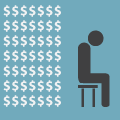How Feeling Blue Can Put You in the Red
 “People pay more to get things when they are sad.” Jennifer Lerner, Director of the Harvard Laboratory for Decision Science, isn’t telling us anything we don’t already know, but it’s still important. We tend to overpay for products when we’re feeling down.
“People pay more to get things when they are sad.” Jennifer Lerner, Director of the Harvard Laboratory for Decision Science, isn’t telling us anything we don’t already know, but it’s still important. We tend to overpay for products when we’re feeling down.
So when your cat dies, your boss chews you out, or your spouse tells you for the umpteenth time to buy the garbage bags with the little drawstrings, the price tag on those Dolce & Gabbana sunglasses suddenly doesn’t seem so unreasonable. In Lerner’s studies, the estimated price of a product varied by 300% depending on one’s emotional condition, with sad subjects thinking it was worth much more than it really was. This spells bad news for gloomy shoppers and great news for anyone selling products at a gigantic markup.
It might seem like going against nature because healing-through-shopping is common for so many of us, but staying out of the Apple store after your stove goes up in a fireball can save you hundreds. Lerner says we think others are the only ones susceptible to such emotional decision-making, but we’re not as immune as we’d like to believe. Even social scientists, marketing gurus, and brainiacs can fall for the newest home gym revolution if they’re bummed out enough. What fraction of P90X owners do you think actually do the workouts? I suspect many simply bought hope, and the going rate for hope can be seen on credit card bills nationwide.
Main point: hit the garden, shoot hoops, or hang with the family if your spirits are low, and leave the car dealership for when you get a raise (and after consulting your Community Ladders financial planner, of course).
Reference: New York Times, Why Brooding Shoppers Overpay
Comments are closed.